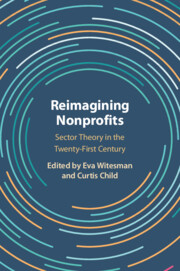Book contents
- Reimagining Nonprofits
- Reimagining Nonprofits
- Copyright page
- Contents
- Figures
- Tables
- Contributors
- Acknowledgments
- 1 An Invitation to Rethink the Nonprofit Sector
- Part I Overviews
- Part II Reflections and Refinements
- 5 Sector Theorists Should Consider How Social Values Determine Unmet Needs
- 6 Sector Theorists Should Embrace a Social Economy Perspective
- 7 Sector Theorists Should Expand Three-Failures Theory to Include the Family Sector and Varied Forms of Government
- 8 Sector Theorists Should Be Wary of the Nonprofit Industrial Complex
- 9 Sector Theorists Should Be Inclusive of Muslim and Non-Western Perspectives
- 10 Sector Theorists Should Revisit the Role of Information
- 11 Sector Theorists Should Borrow Epistemologies
- Part III New Directions
- Part IV Conclusion
- Index
- References
5 - Sector Theorists Should Consider How Social Values Determine Unmet Needs
from Part II - Reflections and Refinements
Published online by Cambridge University Press: 11 January 2024
- Reimagining Nonprofits
- Reimagining Nonprofits
- Copyright page
- Contents
- Figures
- Tables
- Contributors
- Acknowledgments
- 1 An Invitation to Rethink the Nonprofit Sector
- Part I Overviews
- Part II Reflections and Refinements
- 5 Sector Theorists Should Consider How Social Values Determine Unmet Needs
- 6 Sector Theorists Should Embrace a Social Economy Perspective
- 7 Sector Theorists Should Expand Three-Failures Theory to Include the Family Sector and Varied Forms of Government
- 8 Sector Theorists Should Be Wary of the Nonprofit Industrial Complex
- 9 Sector Theorists Should Be Inclusive of Muslim and Non-Western Perspectives
- 10 Sector Theorists Should Revisit the Role of Information
- 11 Sector Theorists Should Borrow Epistemologies
- Part III New Directions
- Part IV Conclusion
- Index
- References
Summary
Hansen and Witkowski introduce a new theory to understand how societal needs are met. The authors develop the cross-sectoral BIAS theory, an adaptation of the BIAS model, to assess factors that lead to persistent unmet needs among marginalized populations. Drawing on postcolonial theory, the authors indicate that the standard economic model of understanding the provision of services by market, government, and nonprofit sectors (three-failures theory) systematically fails to account for the underprivileged in society. The cross-sectoral BIAS theory explains that societal biases drive the persistent insufficient provision of goods to marginalized populations by all three sectors.
Keywords
- Type
- Chapter
- Information
- Reimagining NonprofitsSector Theory in the Twenty-First Century, pp. 91 - 112Publisher: Cambridge University PressPrint publication year: 2024

